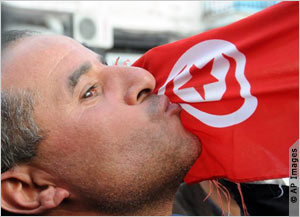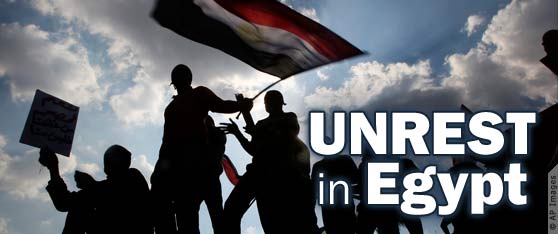Secretary of State Hillary Rodham Clinton holds bilateral talks with Brazilian Foreign Minister Antonio Patriota and previews President Obama’s trip to South America. Clinton also calls peaceful protests in Egypt inspirational. A group of Russian national park and nature reserve managers is visiting the U.S. to exchange ideas about managing protected areas. And, we have two reports on a program that brought Louisiana’s Southern University Marching Band drum line to North Africa.
U.S.-Brazilian Talks
(mobile version)
Secretary Clinton, above, and Brazilian Foreign Minister Antonio Patriota held broad-ranging talks on U.S.-Brazilian issues, regional concerns and President Obama’s upcoming trip to South America in March. Obama’s trip “comes at a time when we are cooperating closely, and our bilateral work on issues and global challenges, including food security and human rights and clean energy and global inequality, is key to both of us,” says Clinton.
From Egypt, Inspiration
(mobile version)
Secretary Clinton says Egyptians have inspired Americans through their “extraordinary example of nonviolent, peaceful protest.” In a social media dialogue, she urges Egyptians to remain vigilant, but says the United States stands ready to assist them.
U.S. and Russia Talk Parks
(mobile version)
A group of Russian national park and nature reserve managers is visiting the U.S. to exchange professional information and experience about managing protected areas. Vsevolod Stepanitsky, the delegation leader and a deputy director in the Russian Ministry of Natural Resources and Environment, says that Russia might find U.S. practices in wildlife management, environmental education and public outreach applicable.
American Drummers in Algiers
(mobile version)
In a program sponsored by the U.S. Embassy and supported by the Bureau of Educational and Cultural Affairs, drummers from Louisiana’s Southern University Marching Band entertained residents in Algiers, Benthala, Sidi Fredj, and Tiaret, from January 31 to February 5.
 Drumming for the Deaf
Drumming for the Deaf
(mobile version)
Members of Louisiana’s Southern University Marching Band drum line, right, performed before several hundred people at the Mohamed V National Theatre in Morocco with Moroccan musicians who, like many members of the audience, were deaf. “It really gives new meaning that if you are deaf, blind, come from a different country or speak a different language, music is basically a universal language,” says drummer Alexander Riggins.





 In Egypt, the Power of Human Dignity
In Egypt, the Power of Human Dignity Henrietta Lacks’ Immortal Cells
Henrietta Lacks’ Immortal Cells
 Fossil Fuel Free by 2050
Fossil Fuel Free by 2050
 Black History Month
Black History Month

 New START for U.S., Russia
New START for U.S., Russia

